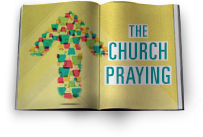Learning to Pray by Listening in Church
During one of the periods of my childhood when neighbors took me to Sunday School, I learned the Lord’s Prayer. Half a lifetime later, middle aged and searching, I recalled that the Lord’s Prayer was often prefaced with the words, “He taught them to pray saying . . . .” I started to say the Lord’s Prayer every night, hoping that he would teach me.
Eventually, he did. By the grace of God, I was converted and was baptized at the age of 49, and once I joined Capitol Hill Baptist Church, I found myself awash in unscripted prayer, along with so much else that was new and strange. In the Sunday morning service, miscellaneous pastors prayed from the pulpit, long beautiful prayers. It was months, if not years, before I noticed any order in this parade: first a prayer of praise; later a prayer of confession, followed by a “scriptural assurance of pardon”; last, a prayer of petition, this one almost always led by the senior pastor. This differentiation was reinforced when I helped in children’s ministry and found that we guide the children’s prayers with the mnemonic device ACTS: adoration, confession, thanksgiving, and supplication. A child in the faith, I clung to it too.
In our Sunday evening service, after hymns, the pastor took a dozen or more prayer requests and asked a member of the congregation to pray briefly for each. We would bow our heads and hear a long string of individual voices pray in different styles. I came to appreciate directness, audibility, and the special loveliness produced, it turned out, by reliance on biblical phrases. We were bringing our cares to “the throne of grace,” where we were promised “help in time of need.” We were “entering his courts with praise.”
Early on, some specific experiences at church impressed upon me the power of corporate prayer. I’ll mention two.
When it transpired that I was to be gone for three months in another state, doing unfamiliar work, the pastor put me on the list for evening prayer. I was helping in the nursery that night, but someone was sent up to get me and usher me into the gathering (in those days, probably no more than 100 people, though we’ve grown since). I was led to the front, and several brothers and sisters placed their hands on my shoulders and back while the pastor prayed for me. I am at a loss for words to describe the effect this had on one long divorced and living alone. It opened up to me a dimension of love that I’d never dreamed existed. Only later would I register its name — Christian fellowship — and read, in the last book of the Bible, “To the thirsty I will give from the spring of the water of life without payment. The one who conquers will have this heritage, and I will be his God and he will be my son.”
Just about five years later the same pastor married me and my husband, Bill. In his wedding sermon he urges: “Pray every day that you will love your spouse better that day than you did the day before. Pray this however unnecessary or impossible it may seem.” I took that to heart, and I pray it still: a prayer taught at church that has helped me learn to be a wife.
Experiences like these burned away the early embarrassment attached to praying in front of others and helped build an understanding of how we work as the body of Christ. As the years have gone by, though, the main instrument of spiritual growth, in prayer as in all else, has been knowledge of the Bible. It is the patient piling of sermon upon sermon over soon two decades that has laid the groundwork for my own study at home and in small groups, all of which has opened to me the riches of biblical prayer.
If Paul hadn’t shown me, in his letter to the Philippians, would it ever have occurred to me to ask for a love that “abounds more and more in knowledge and depth of insight” — think of that: intelligent love, insightful love — so that I might “be able to discern what is best and be pure and blameless for the day of Christ”? Through his letter to the church at Colossae, Paul led me to pray for “endurance and patience with joy,” remembering that it is “the Father who has qualified [us] to share in the inheritance of the saints in light.” I take comfort from relying on his “glorious might.”
To study the Bible is to learn to pray from the masters. I’ve come just far enough to be captivated by what I expect to be a lifelong undertaking — and to espy on a distant horizon what I gather is the really big project, “praying the psalms.”
Despite all the splendid teaching I’ve had, I am not especially proficient at prayer, nor have I laid to rest once and for all what one of C.S. Lewis’s interlocutors in Letters to Malcolm called the “irksomeness” of prayer. Still, I’m on my way. I actually lead a praying life. Every day, I lay before God in faith my serious concerns and daily business of all descriptions. And when my mind is blank, my default setting remains the Lord’s Prayer. I feel blessed to be able to fall back on its familiar words without fear of exhausting its profundities: “Deliver us from evil.” “Thy will be done.”
Writing this, I realize that my every prayer of thanksgiving should properly begin with gratitude to those who took me to church as a child and who, when I was long grown, invited me back.








